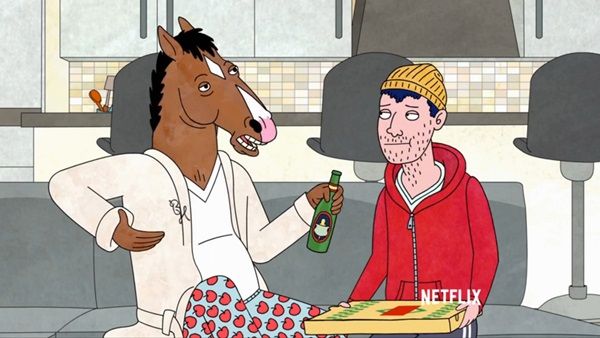Well, dear readers, it’s September. The start of a new school year and, for many of us in our minds, the start of a new year (honestly, after 13+ years of schooling, doesn’t the end of summer feel more like the end of the year than December?), so let us begin anew here at The Buzz too. How, you may ask? Well, with the end of the blockbuster season and the start of the new TV line-up, there’s plenty of new material to dive into and enrich your intellect. This week we review a new indie mind-bender, a new Netflix cartoon, and cover all the news you need. Plus, this article kicks of Sci-Fi month here at Man of the Hour. For every week of September we here at The Buzz will present a new sci-fi short we’ll review, as well as spotlight a classic sci-fi film getting a new Blu-Ray release. Plus, keep your eyes peeled for some sci-fi themed top tens this month. So, without further ado, let’s set phasers to stun and get this week’s Buzz.

Movies: Weekly readers will know that the film reviews here at The Buzz are usually long and thorough. It’s not just about giving the reader a number, or hand gesture or a ripeness of a produce item. We go to great lengths not just to convey an opinion, but to inform the reader enough that they can decide whether the film is for them even if it wasn’t for us. So The One I Love puts us in quite a complicated situation, since to discuss it is to ruin it.
Ever since its debut at the 2014 Sundance Film Festival, mum’s been the word on the plot, with most critics barely saying more than yea or nay, suggesting that to discuss the story of the film past “A couple in a struggling marriage stay at a cabin for the weekend and discover there’s a guest house” will destroy the enjoyment of the film. Finally, now that the film is available in theaters and VOD, the question can be answered.
So the big twist, at least the initial one that hits about 20 minutes in and ignites the narrative? Well, some might find it surprising and unpredictable, and we’ll respect that sense of suspense by not divulging the story. Indeed, perhaps its just this jaded critic who sees an indie film with that premise and already can guess the events that are due to unfold. Yet, the interesting thing about The One I Love is that, despite critical emphasis indicating otherwise, it’s not the premise which matters. The One I Love takes what seems like an unshotTwilight Zone episode and uses the extra hour’s run time to explore the real world ramifications of such an occurrence. Rather than the “archetypes to drive home the message” characters of the Serling show, Elizabeth Moss and Mark Duplass not only bring a third dimension to their characters, they create raw, honest portraits of real people, and let us see how real people would react to such a set of circumstances.
The One I Love uses sci-fi to tackle relationships in the same vein as Her did in 2013, not as an allegory or a metaphor but rather as a real object, a real event through which and against which real human nature is exposed and made open to examination, demanding the audience see something of themselves within these ordinary people in extraordinary circumstances. It deserves and earns the audiences’ respect, even if it doesn’t get their surprise.
——

Back when Tom Cruise was still iconic enough to bring audiences to the ambitious sci-fi epics he attached his name to (unlike the tragically unseen Edge of Tomorrow earlier this year), he played the lead in the 2002 Steven Spielberg film that proved to not only be the acclaimed director’s best film that decade, but indeed one of the best sci-fi films of the 2000’s. Just in time for our Sci-Fi month, Minority Report is getting a Blu-Ray rerelease, bringing a whole new audience to the sights and sounds of this forgotten masterpiece of murder-mystery noir from the mind of Phillip K. Dick. The technology, whilst seeming futuristic upon release, now either exists or is nearly within our grasp, and the gritty story gives Blade Runner a run for its money in terms of pulse-pounding twists and turns. Unlike many films from its decade, Minority Report has aged remarkably well, and deserves a place in any film fan’s collection.
——

TV: If ever a show was mismarketed, it’s Netflix’s first animated venture, Bojack Horseman. Staring Will Arnet as the titular horse, the advertisements portray Bojack Horseman as the typical adult animated fare, a laugh out loud distraction that’s an alternative to the often carefully grounded sitcom. Such promotion apparently took its toll on critics, all of whom seemed underwhelmed that the show wasn’t as uproarious or risqué as theFamily Guys or South Parks it was seemingly meant to rival. Indeed, if viewed as a comedy (as all American animation is), Bojack Horseman features a few scattered laughs, but ultimately fails. Yet, had any watched the show unattained by expectation, they’d realize it was never meant to deliver laughs, at least not by Simpsons standards.
Bojack Horseman is a hard show to place at first. Sure, Bojack is the type of conceded Hollywood type we’ve seen before in cartoons, and his layabout roommate exists as a clear comic relief with zany ideas and unfortunate mishaps. Yet, bits like Bojack’s agent and ex-girlfriend Princess Carolyn, a half-human half-cat, having her ringback tone as “Jellicle Cats” barely lands the first time and gets tired after the second, until the viewer realizes its not a joke. It’s just a quirk. The animal traits and ironic interests of the characters within this world are not only analogous to real-world people and their behavior, but indeed exist to flesh out these cartoon character milling about within this superficial system of stars and has-beens.
Bojack Horseman isn’t interested in guffaws, at least not as its prime goal. It’s a comedy in the vein ofOrange is the New Black or Louie, just out of the necessity of clarification. Subjects like Bojack’s former partner suffering from cancer or his former co-star’s drug addiction aren’t played for laughs. he plot isn’t crafted around jokes, but rather events unfold in order to bring Bojack to a point of epiphany. There are some truly heartfelt, beautifully poignant moneys in the show, from an episode opening with the suicide of Bojack’s childhood hero to an ending of Bojack plainly asking “Am I a good person?” to be met with silence. It takes the uninformed viewer at least half of the run to realize that Bojack isn’t a failed comedy, but rather something never before attempted on American television: an animated character study. Bojack feels more real than almost any cartoon character, and his struggle is more Don Draper than Fred Flintstone, as evidenced by a brilliantly melancholy finale soundtracked by, what else, “Wild Horses”, less and ironic play on the show’s title than a means to drive home the desolation of Bojack’s inner and outer life.
——

News: This week several prominent Hollywood women were victims of an elaborately orchestrated act of theft and humiliation when private, intimate photographs were released to those willing to pay the anonymous hacker via the crypto-currency bitcoin, and the purchased photographs were subsequently posted, originally on 4chan’s /b/ message board and spreading even to somewhat more regulated websites like Reddit, whose r/celebs message board has allowed the photographs to remain (despite the site forbidding many other images and posts with a much stronger case for being “free speech” in the interest of good taste). Originally attributed to a fault in iCloud security, the source of the images currently remain unclear, and the internet is seemingly ablaze with outrage and opinion, as this modern technological age has taken matters that were once considered cut and dry wrong, now different only in their execution (digital rather than physical) and caused the public to give them a reappraisal, as though all of modern life was thrown into a moral grey area with the advent of social media. Its times like these, even in this sickening abyss of talking heads and ire-earning opinion-blasts, that dry, fact based reporting will not do. While still holding true to fact and objectivity, there are times when editorializing is necessary; when such seemingly “opinionated” journalism is what it takes to contextualize such an event, and remind us what we should rationally already know, and while this column isn’t often one of heavy commentary or “serious journalism”, we hope our readers will permit such editorializing for a moment:
The hacking which resulted in the private photographs of Jennifer Lawrence and other notable individuals is a crime, plain and simple. It is a detestable act of exploitation and an invasion of privacy so foul that it's very repugnance is inarguable. Such images should not be shared, reposted or viewed in any way, and there is no defense of such actions, no level of "They shouldn't have taken them" or any other moronic, pseudo-moralistic criticism which would carry any weight on the subject. Granted, no one can be blamed for having a hunger for such images in a cultural landscape which, through photoshoots and fan sites, goes to great lengths to so sexualize these women that it fuels, if not outright sparks, a flame of "I wonder what she looks like naked".
That said, while such an action is a crime, it is not rape. Please, please stop calling it rape. Please stop saying "Looking at these pictures is like raping ________". It's not. It's, by its definition, voyeurism. It's like peeping through someone's window while they change. But it is not like rape. Looking at intimate photographs is not "like rape". Even the very act of stealing, or even taking said photographs, while a crime, is not "like rape". The only thing like rape is rape, like the kind which took place systematically on a grand scale in Rotherham, England; which has failed to warrant any of the social media outrage these "leaked" photographs have earned. This is not to suggest the invasion of a woman's privacy with the intent of publishing private intimate photographs isn't a crime. It is indeed, and the perpetrators are vile individuals. However, to compare what at its core is the worst possible outcome of taking private, compromising photographs to the worst possible thing one human could do to another is not only hyperbolic but indeed demeaning to those whose psychological scars are irreparable; and to focus your outrage on celebrity privacy violations whilst things like Rotherham go unremarked upon is like worrying about the “knockout game” while a genocide takes place.
——
Short Film: Sci-Fi can do many things. It can inspire, it can inform, it can intimidate, or sometimes it can simply scare the ever-loving sh*t out of you. Well, holy first rule or robotics Batman, Rob McLellan’s masterful monster-bot manages to scare even the strongest advocate for AI. Like Buffalo Bill with a circuit board, Abehas his victim in the palm of his hand, and yet still chooses to expound on why he feels the need to kill. Yet, unlike the usual route of sympathetic justification, McLellan keeps his protagonist cold-blooded (for lack of a better term). The CGI is massively impressive for an independent short, and its no surprise its been optioned for a feature film. Calculating and yet still mildly animalistic in his stalking, Abe proves to be one of the more memorable robots in a genre full of them.

No comments:
Post a Comment